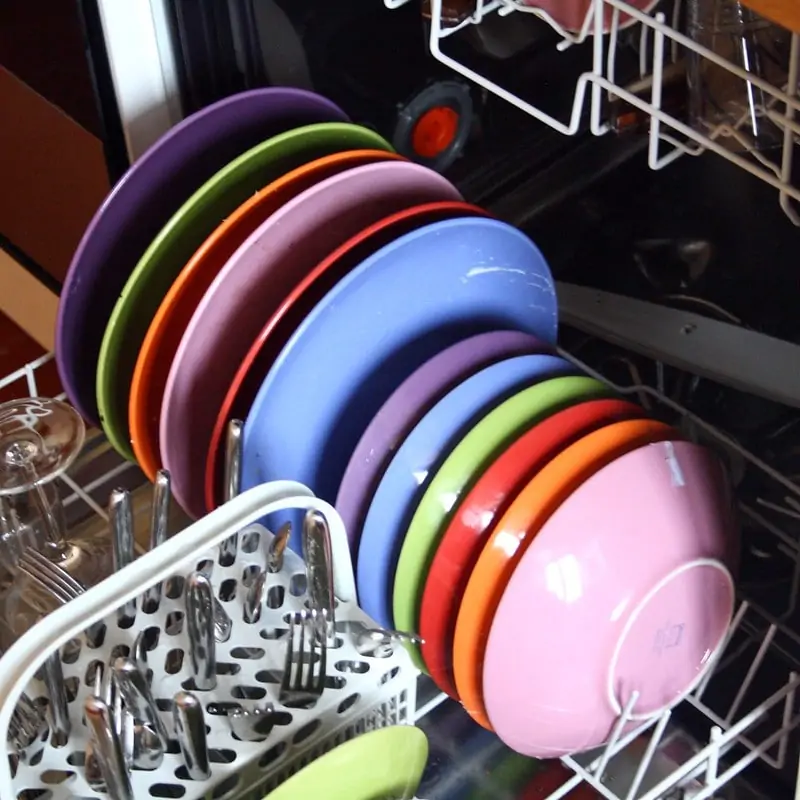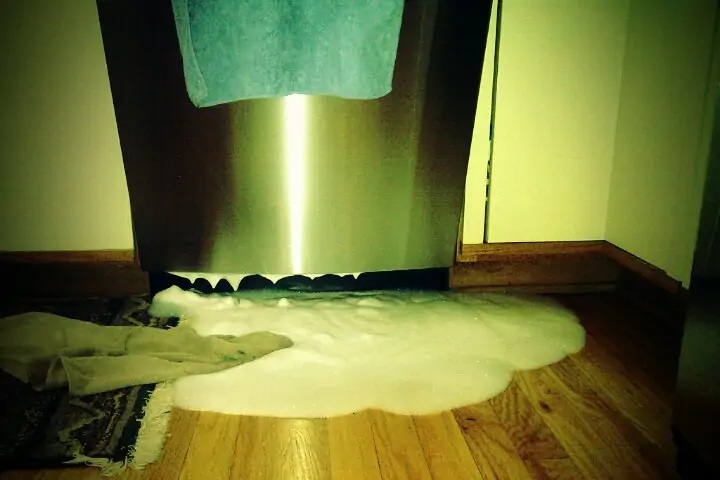What do you do when you run out of dishwasher detergent?
It is very tempting to use dish soap instead, especially when you don’t have clean plates to use for breakfast.
However, this seemingly minor substitution, believe it or not, can result in chaos in your kitchen.
By itself, dish soap should never be used as a dishwashing detergent alternative. That said, we can share with you how to use dish soap combined with other ingredients to clean your dishes without it resulting in a floor full of suds.
What Happens When You Use Dish Soap in Dishwasher?
Also, besides dish soap, there are a few other household products you can use as dishwasher detergent substitutes in a pinch that we will be sharing with you.
We will also show you a way out of the disaster if you have already used dish soap in the dishwasher. It may not be as easy and quick as you want it to be, but it will have your dishwasher running and your kitchen looking like you never made this common mistake.
Dishwashers require a specially formulated detergent that is intended for doing maximum cleaning like breaking down grease and oils of food.
More importantly, though, dishwashing detergents do not create suds during the washing cycle.
Regular dish soaps, on the other hand, are formulated to create foamy suds that help with regular cleaning.
Even a small amount of regular dish soap can produce a substantial amount of suds and bubbles. You may even enjoy them when you’re washing dishes by hand in the sink.
When regular dish soap is used in a a dishwasher, however, the resulting suds can easily spill out and all over your kitchen floor.
Even if the suds don’t pour out, you may need to run the dishes through the dishwasher at least twice to completely wash off the suds and their residue. This means you will be using more water than absolutely necessary and are just pouring more money down the drain.
Don’t worry: your dishwasher probably won’t be damaged by your using dish soap once. It just creates a big messy headache for you.
But, if you try to use dish soap in the dishwasher regularly, soap scum will build up in your machine, which could end up breaking it entirely.
The dishwasher’s entire plumbing system is made in such a way that it can only handle specially formulated low-sudsing detergents. It is not designed to cope with the amount of suds created by dish soap; too many bubbles can mess up your machine’s plumbing system.
Aside from this, the resultant flood of suds can damage your kitchen floor and possibly electrical outlets and other appliances nearby.
Dishwasher Detergent Hack
It is always a good idea to have items on hand that you can use in making an emergency dishwasher detergent substitute. In fact, you probably already have some in your kitchen.
We have a very simple but very effective recipe that uses simple, common ingredients. This recipe calls for just dish soap, baking soda, and Epsom salt.
While it is not normally recommended to use normal dish soap as a substitute for dishwasher detergent, combining it with baking soda will create a suitable emergency detergent replacement.
The baking soda is the most important part of this recipe—don’t try this hack without it.
The baking soda keeps the dish soap from forming suds and bubbles. This way, the soap can do all the grease-cutting and cleaning your dishes need, without making suds that will overflow and, ultimately, destroy your dishwasher.
Another good ingredient to try in your dishwasher is kosher salt. It is used for extra scrubbing power, particularly when you have stuck-on food on the dishes.
Ingredients:
- A few drops of mild liquid dish soap
- 1 ½ teaspoons baking soda
- 1 teaspoon Epsom salt
It won’t hurt if you add a bit more than these recommended measurements, especially if you have a large load in your dishwasher. It won’t harm the dishes.
Instructions:
- Add the liquid dish soap to the dishwasher’s detergent cup.
- Add the baking soda and Epsom salt.
- Run the dishwasher as normal.
Alternatively, you can mix 2 teaspoons of liquid dish soap, 4 teaspoons of baking powder, and 4 cups of warm water and add that solution to the dishwasher’s detergent cup. You can do away with Epsom salt entirely, especially if you are lucky enough to have soft water.
What If I Don’t Have Any Dish Soap?
There are a lot of common household products that you most likely have on hand that you can use as dishwasher detergent substitutes in a pinch.
- Washing Soda: Also known as sodium carbonate, it raises pH, softens water, neutralizes chlorine, and cuts grease.
- Baking Soda: It is a naturally mild and abrasive cleaning agent. When combined with dish soap, it does a good job in removing food particles on your dishes. Baking soda can also raise pH and helps in controlling odors.
- Distilled White Vinegar: Its acidic properties can cut through any greasy residue on the dishes. Put one-half cup of it in a bowl and place it on the top rack. It will be distributed to the other contents of the dishwasher by the force of the water.
- Borax: This is a usual ingredient for homemade and commercial dishwasher detergents alike. It acts as a pH buffer, softens water, and neutralizes odor in your dishwashing load.
- Lemon Juice: Works just like vinegar in that it is a mild acid that will cut through residue on dishes. Just be sure to strain fresh lemon juice to remove any pulp and avoid finding dried pulp on your dishes.
What Should I Never Use in My Dishwasher?
When using products that are not specifically designed for the dishwasher, there is always the possibility that its gaskets, seals, and plastic parts will be damaged.
These products can also contain chemicals that may not rinse off properly and can stick onto your dinnerware.
Never be tempted to use products that are not intended for use in a dishwasher. Other soaps and detergents provide different types of cleaning and may contain perfume and scents. When heated during the dishwashing cycle, these scents can turn into a gas that can be toxic when inhaled.
Laundry detergents, specifically, usually also include bleach and other chemicals, making them completely off-limits as a soap to try to clean dishware and cookware.
So, if you ever run out of dishwasher detergent, you can just either wash the dishes with regular dish soap in the sink, or just wait until you can get out to the store to buy more instead of using the following as substitutes. They can cause more damage than you think.
- Dishwashing liquid (without adding baking soda)
- Any kind of laundry detergent
- Shampoo
- Body wash
- Household all-purpose cleaners
What Do I Do If Someone Puts Dish Soap in the Dishwasher?
By now, you know how big a mess you have to deal with when dish soap is put into your dishwasher. We have some tips on how to best cope with this problem.
- Stop the machine. You also have to cancel the cycle. Stopping it quickly will keep the suds from seeping out of the machine and let you place towels on the floor to control the imminent mess. This will also prevent more dish soap from working its way through the dishwasher’s system. And if you cancel the cycle, the dishwasher should start draining.
- Use towels to soak up suds. Immediately grab several towels and start laying them down to avoid water from seeping behind your dishwasher and cabinets.
- Remove all the dishes in the dishwasher. Once the machine finishes draining, open it and remove all the dishes you were trying to clean. Get rid of as much soap residue on the dishes as you can by washing them in the sink.
- Remove excess water and soap suds from the dishwasher. You will need to rinse and dry the entire inside of the washing machine to get rid of leftover suds and soap residue. Wash the soap dispenser thoroughly if this is where you had placed the dish soap to ensure it has been removed entirely.
- Dry the bottom part of the dishwasher. Be careful not to touch the heating coil, as this may still be very hot. Use a towel to wipe away any remaining dish soap.
- Let the rinse cycle run for a few minutes. It is to be hoped that you were able to effectively clean the dishwasher by hand to prevent any more suds. If soap suds still continue to spill out of the dishwasher, keep running the rinse cycle until all the dish soap washes out.
Conclusion
Substituting ordinary dish soap for dishwasher detergent is a decision that you will later greatly regret. Only detergents that are specially formulated for dishwashers that do not create bubbles and suds should be used in your dishwasher.
Ordinary dish soaps are designed to create foamy suds–lots of them. But a few drops of liquid dish soap combined with baking soda is actually a great alternative in a pinch.
If you made the mistake of putting dish soap in your dishwasher, prepare yourself for a lot of work. You need to rid your machine of the suds, wash your dishes by hand in the sink, and clean the sudsy and slippery mess your dishwasher created on the floor.
Frequently Asked Questions
Will dish soap ruin a dishwasher?
The suds build-up created by dish soap can damage pipes, clog filters, and affect the drainage of the dishwasher. It can also affect the gaskets and all the plastic and synthetic parts when dish soap is regularly used instead of a dishwashing detergent.
The suds can create a film on the dishes and the inside of your dishwasher as well. Suds are difficult to flush out and if not done properly, this film will sit and build up in the machine.
What do you do if you put dish soap in the dishwasher?
The key is to act fast to limit the damage to your dishwasher, floors, and dishes.
The first thing to do is to stop the machine and cancel the cycle. This will make the machine drain automatically.
Use towels to soak up the suds that can otherwise seep through your floors and cabinets. Then, remove the dishes from the machine and place them in your sink to wash off leftover soap suds and residue by hand.
Then comes the most laborious task: rinsing the entirety of the inside of the dishwashing machine.
Be sure to remove all soap dish residue, including from the soap dispenser. When done, you additionally need to wipe and dry the inside of the machine.
Do not forget to towel dry the bottom of the dishwasher as well.
Run the rinse cycle to check if bubbles and suds are still forming. If there are still suds spilling out of the dishwasher, keep running the rinse cycle until the soap dish is completely washed out.
What can I use instead of dishwasher soap?
We have listed above five alternatives to dishwasher detergent. But, if you want your dishes to come out of the washer as clean as possible without it, try this simple recipe of dishwashing soap and baking soda.
Put three drops of liquid dishwashing soap in the soap slot of the dishwasher. Then, fill the dispenser the rest of the way with baking soda. The baking soda is vital: it will help you avoid an avalanche of suds bursting from your dishwasher.
Why is my dishwasher leaving soap on dishes?
The water you use inside the dishwasher must be hot enough for soap to be properly dissolved.
The optimal water temperature for most machines is between 120° and 150°F.
Running water in the dishwasher that is too cold will leave a white residue in the form of undissolved soap on the dishes.
However, hot water can only dilute so much soap in a cycle. If you’re sure that your water is at the right temperature but you still have soap left on your dishes after the dishwashing cycle is finished, you may be using too much detergent. Try using half your regular amount and see if this solves the problem.
Rinse aids also help eliminate spots and residue. They encourage water to run off the dishes to rinse them more efficiently. When more water runs off your dishes, the less is the likelihood of soap staying on them.
Can you run a dishwasher without soap?
Actually, yes, you can.
Hot water alone plays a major role in removing all the grease food debris left behind on your dishes and also serves to kill a broad range of dangerous bacteria on our cookware.
A lot of food we eat can, in fact, simply be rinsed off of our dishes with very hot water. Sugars, starches, and other carbohydrates are water-soluble. All that’s needed to wash them off dishes is hot water.
Proteins and animal fats are not water-soluble, though, so you need an alkali to break them down. The most widely used are washing soda, baking soda, vinegar, and lemon juice.
Can I run a dishwasher without hot water?
Most dishwashers need the water entering it to be at least 120°F. They have a built-in heating element located at the bottom of the tub that will further heat the water to 140-145°F during the main wash and final rinse.
Dishwashing machines with a sanitation cycle must be able to reach a minimum of 150° during the final rinse.
Owners often complain about not getting the proper performance from their dishwashers. Most often than not, the reason is that the water entering the machine is below 120°F. On its own, the dishwasher cannot compensate for the temperature difference and this results in its under-performance.
Additional Resources:
YouTube: How to Fix Dishwasher after Using Dish Soap
WikiHow: Four Ways to Clean and Maintain Your Dishwasher
“dishwasher” (CC BY 2.0) by David Locke;“Dish Soap In Washer” (CC BY 2.0) by holisticmonkey







Bryce is not a real professor, but he's real nerdy in the kitchen. He's been barbecuing, chopping, and generally blazing food for many decades. He thinks there's definitely a better spatula or utensil out there that hasn't been invented yet.